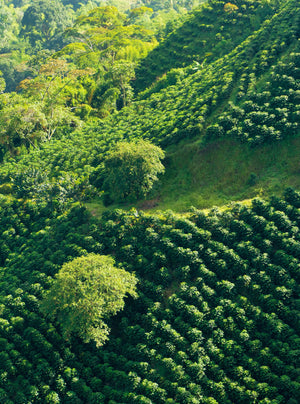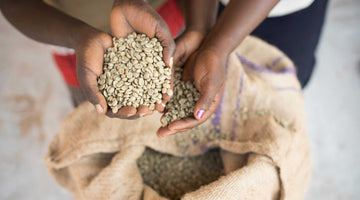Overview:
From the Finca La Paz farm in Nariño, this Colombian coffee was produced by Juan Francisco Alfonso Ortiz Sepulveda using an experimental macerated natural process to offer a fruity and tart cup of coffee. We tasted cranberry and black cherry in the body with the mouthfeel of almonds. As the cup cools, notes of tangy, citrusy kumquat start to emerge.
More Info:
This coffee comes from the Finca La Paz farm that over looks the beautiful landscape of the Andes in northern Nariño, Colombia. Juan Francisco Alfonso Ortiz Sepulveda brings out a flavor profile is that is wild, sweet, and floral with his experimental macerated natural processing.

The Andes of northern Nariño create a rugged and broad landscape for coffee with high altitudes and steep slopes. Most of the producers in the region went unnoticed until the past decade due to steep conditions to reach the farms. The region is known for these high altitudes and steep slopes, along with volcanic loam composition. This department has 6 of Colombia’s 16 volcanoes, producing an ideal soil for agricultural use as it retains nutrients and water while allowing excess water to drain away. These remote microlots are revered for producing internationally recognized, competition-winning coffees.
About Process:
Juan utilizes a curing step in the process that involves bagging the cherries just after picking, allowing the whole fruit to cure in a low-light, low-oxygen environment for multiple days. This uncommon step has the cherries bagged for 4 days before being dried with a combination of shaded raised beds and mechanical drying drums. The effect of the curing stage, creates a concentrated tartness in the final cup evocative of pickled plum or cherry syrup. With complex high-elevation coffees like this, the note adds a certain kick to the rest of the coffee’s balance, which arrived tasting like dessert wine, dried cherry, and chocolate.

About Certification:
The producer was able to profit from this selection, which is always a great achievement for the work they do. Juan succeeded to establish a full financial transparency price with Azahar Coffee who sourced and exported this offering. The Azahar team shares their time between the quality lab and traveling around Colombia working directly with producers, which helps them to secure special micro-lots and offer an exporting model to the producer from which he can profit, despite the initial investment on production cost, and the exchange rate for Arabica coffee. Like PRESS, Azahar believes that good coffee farming should be profitable.

About Variety:
The Colombia cultivar was one of the country’s first widely available F5 composite hybrids, first released in the early 1980s. It follows the Catimor recipe, using Caturra and Timor Hybrid parents. The offspring is selected for desirable attributes and bred down to a fifth generation to produce a complex seed stock with good stability and disease resistance.






